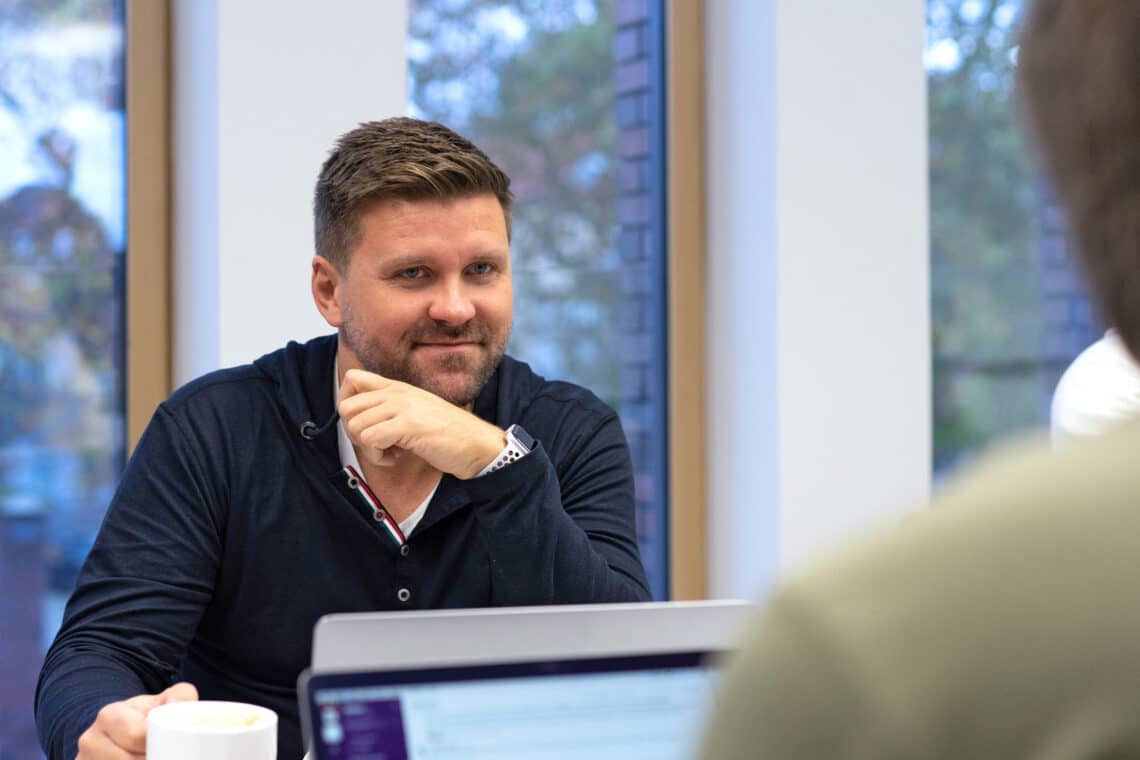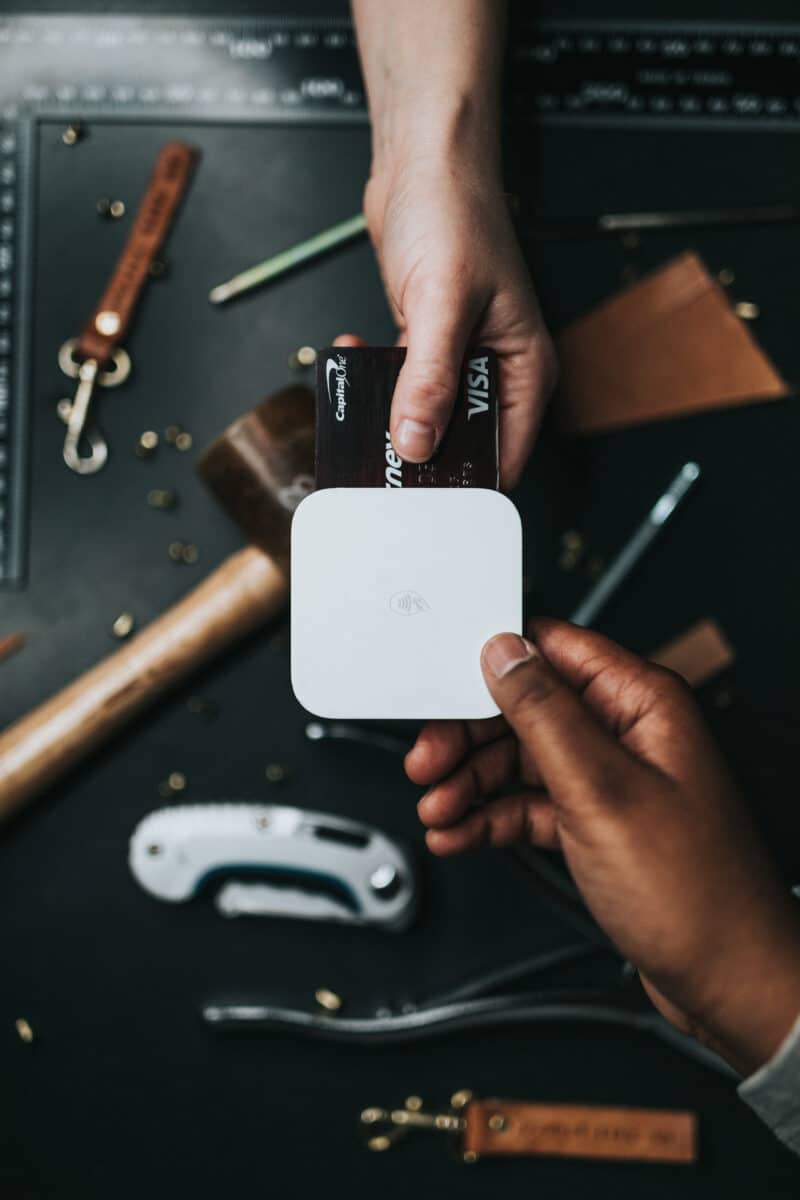As the Payment & Banking team we try to keep a continuous overview of the industry and report on small and large Fintechs and InsurTechs, on established banks as well as neo-banks, on digital strategies, on major investments of national and international financiers, report about exits and provide analyses on current topics.
Some companies appear more often in the reporting than others. We want to change this and are starting a new section with “what is …”, in which we will pay attention to the many great companies in the industry that are doing a great job, but sometimes stay a little under the radar in their daily business. We want to know what the founders are up to right now, what the current state of affairs is, what plans are currently being pursued, and what the company will soon surprise us with.
In the current edition we will talk to David Niedzielski from finstreet about the current staff growth and what Corona has to do with it, about the persuasion young companies have to do towards established players and how the “kinship” to Compeon actually is.
Hello David, how are you and how have you adjusted to the current situation?
Almost all of us are in the home office and we are now carrying out our projects completely remotely. Although we were basically prepared for this and have already gained a lot of experience internally, remote collaboration with some customers did present a number of challenges: These ranged from the use of modern collaboration tools, which were not always compatible with the bank’s security settings, to the transfer of originally planned full-day workshops on site to the digital world.

But in the meantime, I have the feeling that everyone has come to terms with the situation and that it is now working very well. Nevertheless, I am looking forward to meeting our customers again in person without any danger.
In addition, we used the Corona situation to rebuild our office in Münster – a project that we had planned some time ago. Together with an interior designer, we developed a modern concept that both promotes exchange between employees and enables concentrated work. The main motivation, however, was actually the strong growth in personnel in recent years.
Many companies have become inventive and have introduced the “digital coffee break” or even the “digital cigarette”. How are you handling this?
We have moved the obligatory after-work beer on Friday evening from our roof terrace to a virtual room. In general, remote meetings are incredibly important right now. Especially when you are growing fast and hiring new employees due to the special market conditions. Unfortunately, these employees do not have the opportunity to experience the finstreet spirit live in the office at the moment. We also try to catch this in informal communication in the best possible way by virtual means.
In order to get to know our new colleagues a little better in a playful way, we have recently started an internal betting game. Once a week, all new employees are invited to give a tip on the performance of a selected application, for example on the Forecast of the current conversion rate. The winners will receive changing prizes delivered free of charge. Last week it was a gin-tasting box from a local distillery.
Sounds like you’ve been busy these past few weeks…

Absolutely! Last year, we completed a digital financing portal for the German guarantee banks, which met with a very positive response from middle-class, particularly during the COVID 19 pandemic. We at finstreet also felt this directly in the operations area, as we are also responsible for servicing guarantee requests.
To cope with the big rush at the beginning, we quintupled our team within a few days. Our personal network in Münster, which we have greatly expanded in recent years, has been particularly helpful here.
Another challenge in recent weeks was to optimize our Software-as-a-Service (SaaS) product eco.banking, a solution for digitizing the commercial loan process, for the KfW Corona assistance. When the first details of the subsidy programs were released, we reacted directly and worked on the professional and technical implementation, literally 24/7. Just in time for the start of the KfW Quick Loan we then rolled out the release and supported our customers in structuring and efficiently handling the high demand for loans.
Münster is really a nice little town, but what advantages does the location Münster have for you?
In fact, we were not founded in Münster, but in Emsdetten, a town of 30,000 inhabitants 30 kilometers away. It wasn’t a garage, but our granny flat in the city center wasn’t far from the flair. With finstreet we moved to Münster only in 2018, when the space in Emsdetten was no longer sufficient.
Münster is characterized by characteristics such as down-to-earthiness and entrepreneurship and has a very distinct modern as well as scientific component due to the renowned university. These characteristics are also reflected in our finstreet culture. Furthermore, the loyalty of the employees to their companies is high compared to other cities in Germany. This can also be seen in our very low fluctuation.
In addition to Münster, we also have offices in Berlin, Düsseldorf and Frankfurt, the headquarters of our specially founded agency for UX/UI design and brand and motion design.
What problem did you identify at the time of foundation, 2014, and what worked from the beginning, where did you have to adapt?
Our approach is to develop digital solutions that are as efficient as possible and geared to customer needs. In our view, this requires agile methods, which, however, were virtually non-existent in the financial industry until 2014. What sounds very simple in theory, in practice meets a number of challenges and in some cases even resistance. Projects and almost all relevant framework conditions – such as specifications, approvals, required decision-making powers or even reporting – were based on waterfall methods. As a young player in the business, we were therefore not only confronted with the professional and technical requirements, but also did a lot of persuasion and coaching with our customers.

In the meantime, we have developed a hybrid process model that builds a bridge from the classic process approach to the agile world.
In 2018, you have been voted the fastest growing FinTech in Germany by the Gründerszene. When you founded the company, did you call yourself a FinTech, or did you call yourself a software-company?
We have often asked ourselves the same question. In 2014, the term FinTech was not really well defined in Germany. At that time, Google Alerts posted a maximum of two to three times a week. This has changed significantly in recent years. We do not necessarily see ourselves as FinTech in the narrower sense, such as N26, but we combine finance and modern technologies and develop independent business models for our customers. Therefore, I would at least count us as a FinTech in the broader sense.
In addition, we accompany our customers not only in the phases of ideation, service design and technical development, but also support them in the growth and scaling phase and, in some cases, take on the responsibility of making the business model profitable. This definitely sets us apart from pure software stands.
Sometimes it is claimed that COMPEON is a sister company of finstreet? Is that true?
No, there is no parent company to which both companies belong. However, the three founders of COMPEON are also shareholders of finstreet, but we are not sister companies. We occasionally work together in the implementation of digital solutions, but there are very clear boundaries between our companies and the responsibilities. Information is not exchanged back and forth.
Furthermore, finstreet is, in contrast to COMPEON, completely self-financed. We will not take up any venture capital for expansion in the near future – even if we receive repeated requests for this. We want to retain the power of decision. We do not think in terms of financing rounds, but increasingly in terms of cooperation models in which similarly ticking players from the industry pursue business goals together.
In recent years you have launched your own FinTechs with entrafin, CashCape and tr8fin: Why is that?
On the one hand, we ourselves had ideas for innovative business models and, on the other hand, renowned experts from other industries approached us with exciting ideas to benefit from our know-how. There are essentially two reasons why we build up our own FinTechs: On the one hand, the Entrepreneurial Spirit, which is deeply rooted in our corporate DNA, must be emphasized. Many colleagues are simply attracted by the challenge of becoming entrepreneurs themselves and building a start-up from the start.
On the other hand, the synergy effects to finstreet’s core business are great, as we achieve many important learning effects here, from which our customers in projects also profit directly. At the same time, by building up our own FinTechs, we can credibly demonstrate that we do not see digital solutions as “fancy apps”, but rather as real business models.
“”By building our own Fintechs, we can credibly demonstrate that we understand digital solutions as real business models”.
You know both sides now: Banks and start-ups. What is your assessment: Has the cautious sniffing already turned into friendship between the two?
The landscape of cooperation between banks and FinTechs is very heterogeneous. I would not yet call most of the mergers friendship. It is more comparable to a closer acquaintance. Both have learned an enormous amount from each other in recent years. Most FinTechs had to recognize that customer acquisition and trust is a difficult undertaking and that banks are subject to strong regulatory requirements. On the other hand, banks have learned a lot from FinTechs about customer-centric approaches, agile methods and modern technologies. The cooperation between banks and FinTechs now works well wherever both have adjusted to each other and benefit from each other’s strengths without feeling threatened in their own existence.

